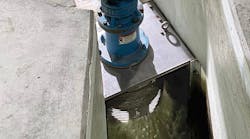The 100-acre facultative lagoon system at the Iola, Kan., wastewater treatment plant was plenty big enough to meet the needs of the community: a population of about 5,700, plus a local candy manufacturer. However, the design used only about a third of each cell, and over time a variety of water quality issues accumulated, starting with short-circuiting.
A lagoon retrofit in 2007 brought the system under control and in compliance without the need for high-horsepower equipment. Instead, 11 SolarBee mixers thoroughly mix the cells, helping the plant the meet biochemical oxygen demand (BOD) and total suspended solids (TSS) discharge limits, while preventing odors in the spring when the cells turn over.
“Along with short circuiting, we had poor dissolved oxygen distribution and uneven TSS buildup,” said Toby Ross, wastewater superintendent. “To solve the problem, we at first tried a wetland pilot plant to try to reduce our BOD and TSS but it was too small and didn’t make an impact.”
Mixers Improve Hydraulic Circulation
The final solution lay in improving the efficiency of the system by taking advantage of the large lagoon volumes. Without changing the plant’s capacity, engineers recommended adding an equalization basin in front of the lagoons to bring in diffused air and increase dissolved oxygen.
From the equalization basin, wastewater flows through the three-cell lagoon system, which comprises approximately 100 surface acres with an operating volume of 157 million gal and an operating depth of about 5 ft. Influent and effluent piping was changed to utilize the entire cell. Prior to discharge, water flows through a final polishing cell, where a cover was added to block out sunlight and kill off algae, as well as baffles, which lengthen the hydraulic detention time.
Within the lagoon system, six SolarBee mixers are installed in cell No. 1; three in cell No. 2 and two in cell No. 3. The job of the mixers is to improve hydraulic circulation and mixing in the cells, which reduces short-circuiting and improves dissolved oxygen and suspended solids distribution.
“The engineers recommended the SolarBees,” Ross said. “We wanted mixing in the cells, but we didn’t want the additional costs of wiring all of the mixers in. SolarBee gave us the mixing we wanted by using the sun to power the units.”
The SolarBee mixers are able to provide the required mixing despite large BOD loading from the candy plant, which accounts for about half of the lagoons’ BOD load.
The mixers take advantage of the way water forms thin horizontal layers in all reservoirs. Utilizing solar power, they pull in water at the desired depth from all corners of the lagoon, and provide efficient mixing that distributes dissolved oxygen evenly throughout the mixed depth.
The mixers also help reduce odors when the lagoons turn over twice a year. “Before the upgrade, the odor was horrible in town” said Ross. “Since the lagoons are located south of town and the wind is usually out of the south, all the odors are blown right into town. Since the upgrade the lagoons still turn over twice a year, but the odor is very minimal.”
The mixers help make the superintendent’s job easier by meeting the all-important discharge limits. “The discharge limits are 30 mg/L for BOD and 80 mg/L for TSS, and we have met those limits ever since the upgrade,” said Ross.
Pat Schnaidt is vice president of marketing at Medora Corp. Schnaidt can be reached at [email protected] or 970.484.3437.



